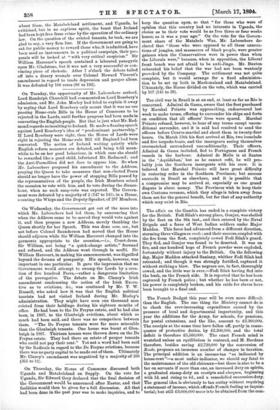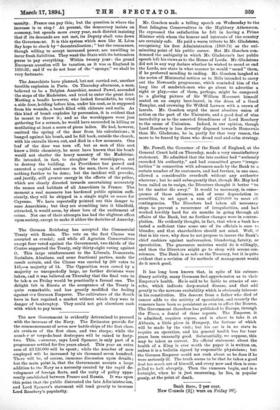The French Budget this year will be even more difficult
than the English. The one thing the Ministry cannot do is to check the ever-increasing expenditure caused by the- pressure of local and departmental importunity, and this. year the additions for the Army, for schools, for pensions, for postal extensions, and the like, amount to £3,360,000. The receipts at the same time have fallen off, partly in conse- quence of protective duties, by £2,200,000, and the total deficit is therefore £5,560,000. The exact French mind is wretched unless an equilibrium is restored, and M. Burdeau therefore, besides saving £2,720,000 by the conversion of Rente, proposes an immense number of changes in taxation. The principal addition is an income-tax "as indicated by house-rent "—a most unfair indicator, we should say fatal to- the maintenance of the old chitteaux—but there is also to be a tax on servants if more than one, an increased duty on spirits, a graduated stamp-duty on receipts and cheques, beginning with ld. and rising to 4d., and a remodelled succession-duty. The general idea is obviously to tax outlay without requiring a statement of income, which offends French feeling as inquisi- torial; but still £3,000,000 more is to be obtained from the com-
munity. France can pay this; but the question is where the increase is to stop ? At present, the democracy insists on economy, •but spends more every year, each district insisting that if its demands are not met, its Deputy shall vote down the Government. It is this system which men like M. IaSon Say hope to check by " decentralisation ; " but the communes, though willing to accept increased power, are unwilling to incur fresh liabilities. They want the State with its bottomless purse to pay everything. Within twenty year the grand European question will be taxation, as it was in England in 1816-32; and if we do not hear of the " sponge," we shall be very fortunate.



































 Previous page
Previous page